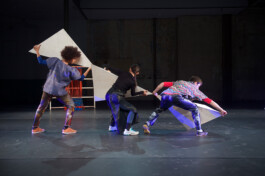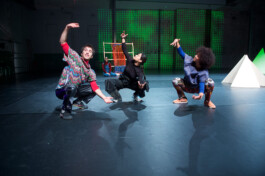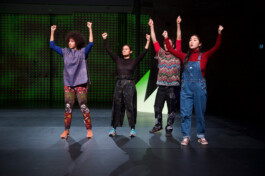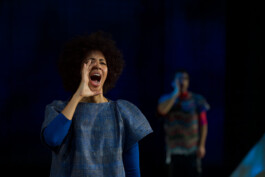History has failed us, but…
premiere: 13.02.2022 Sophiensæle, Berlin
further shows: 14.-16.02.2022 Sophiensæle, Berlin
03. + 04.06. 2022 tanzhaus nrw, Düsseldorf
concept, choreography, performance: Olivia Hyunsin Kim
performance: Ji Sun Hagen, Tatiana Mejia, Enis Turan
sound, performance: Tatiane Heuman
dramaturgy: Isabel Gatzke
artistic advisor: Ixchel Mendoza Hernandez
costume, stage: Kristin Gerwien
costume, masks: Ilona Klein
light, video: Jones Seitz
pop up kitchen: Vicky Truong
access advisor: Hyemi Jo
production: ehrliche arbeit – freies Kulturbüro
audio description: Gerald Pirner, Xenia Taniko
all pictures © Dieter Hartwig, Kristin Gerwien



Christopher Petrella: The opening line of Pachinko, your latest novel, reads: »History has failed us, but no matter.« What inspired such a powerful idea?
Min Jin Lee: »History has failed us, but no matter« serves as my thesis statement. I believe history has failed almost everybody who is ordinary in the world, not just the Korean-Japanese, who are the subject of Pachinko. I am also arguing that the discipline of history has failed. It is not that historians aren’t doing their jobs but rather that the memory of history has been reconstructed by the elite, because the overwhelming majority of ordinary people rarely leave sufficient primary documents; they do not have others recording their lives in real time. The phrase »but no matter« is a statement of defiance. It doesn’t matter that history has failed us because ordinary people have persisted anyway. This idea gives me an enormous amount of strength and hope as a writer because I am an ordinary person. Those of us who may be women of color, immigrants, or working class aren’t often meant to be people who write novels about ideas, but no matter.
Interview with Min Jin Lee, The Guardian, 02.08.2018

If I can’t dance it’s not my revolution. These words, attributed to the anarchist author Emma Goldman, served as a starting point for the performance History has failed us, but... and they accompanied our choreographic investigation of protest and resistance. In what ways does a dancing body become an empowered body and what contradictions may arise from this empowerment? How can individual and collective bodies become resistant through movement? Which narratives and images of resistance linger in our memories and how can they be spoken about and shared?
Inspired by past and present revolts against injustices such as the Gezi Park protests in Turkey, the viral feminist performances of Las Tesis, and the anger over the Sewol tragedy in South Korea, History has failed us, but... recounts protest movements from the perspective of queers and people of color – people whose bodies are still read as “Other" and "foreign." The choreography combines visions of future demonstrations with existing traditional dances – such as the Korean ganggangsullae, which has been danced for centuries by women's groups at full moon for catharsis – into an exchange of playful lightness and political urgency.
Throughout the evening, the dancers draw strength from physically activating specific moments, citing powerful poses and creating togetherness in solidarity together with the audience. The dancing bodies thus become a form of non-violent opposition against discrimination and racism and enriching the imagery and ideas of political movements.
Eine Produktion von Olivia Hyunsin Kim/ddanddarakim in Koproduktion mit SOPHIENSÆLE. Gefördert durch die Senatsverwaltung für Kultur und Europa, die maecenia Stiftung und den Fonds Darstellende Künste aus Mitteln der Beauftragten der Bundesregierung für Kultur und Medien im Rahmen von NEUSTART KULTUR.
History has failed us, but…
premiere: 13.02.2022 Sophiensæle, Berlin
further shows: 14.-16.02.2022 Sophiensæle, Berlin
03. + 04.06. 2022 tanzhaus nrw, Düsseldorf
concept, choreography, performance: Olivia Hyunsin Kim
performance: Ji Sun Hagen, Tatiana Mejia, Enis Turan
sound, performance: Tatiane Heuman
dramaturgy: Isabel Gatzke
artistic advisor: Ixchel Mendoza Hernandez
costume, stage: Kristin Gerwien
costume, masks: Ilona Klein
light, video: Jones Seitz
pop up kitchen: Vicky Truong
access advisor: Hyemi Jo
production: ehrliche arbeit – freies Kulturbüro
audio description: Gerald Pirner, Xenia Taniko
all pictures © Dieter Hartwig, Kristin Gerwien

Christopher Petrella: The opening line of Pachinko, your latest novel, reads: »History has failed us, but no matter.« What inspired such a powerful idea?
Min Jin Lee: »History has failed us, but no matter« serves as my thesis statement. I believe history has failed almost everybody who is ordinary in the world, not just the Korean-Japanese, who are the subject of Pachinko. I am also arguing that the discipline of history has failed. It is not that historians aren’t doing their jobs but rather that the memory of history has been reconstructed by the elite, because the overwhelming majority of ordinary people rarely leave sufficient primary documents; they do not have others recording their lives in real time. The phrase »but no matter« is a statement of defiance. It doesn’t matter that history has failed us because ordinary people have persisted anyway. This idea gives me an enormous amount of strength and hope as a writer because I am an ordinary person. Those of us who may be women of color, immigrants, or working class aren’t often meant to be people who write novels about ideas, but no matter.
Interview with Min Jin Lee, The Guardian, 02.08.2018



If I can’t dance it’s not my revolution. These words, attributed to the anarchist author Emma Goldman, served as a starting point for the performance History has failed us, but... and they accompanied our choreographic investigation of protest and resistance. In what ways does a dancing body become an empowered body and what contradictions may arise from this empowerment? How can individual and collective bodies become resistant through movement? Which narratives and images of resistance linger in our memories and how can they be spoken about and shared?
Inspired by past and present revolts against injustices such as the Gezi Park protests in Turkey, the viral feminist performances of Las Tesis, and the anger over the Sewol tragedy in South Korea, History has failed us, but... recounts protest movements from the perspective of queers and people of color – people whose bodies are still read as “Other" and "foreign." The choreography combines visions of future demonstrations with existing traditional dances – such as the Korean ganggangsullae, which has been danced for centuries by women's groups at full moon for catharsis – into an exchange of playful lightness and political urgency.
Throughout the evening, the dancers draw strength from physically activating specific moments, citing powerful poses and creating togetherness in solidarity together with the audience. The dancing bodies thus become a form of non-violent opposition against discrimination and racism and enriching the imagery and ideas of political movements.